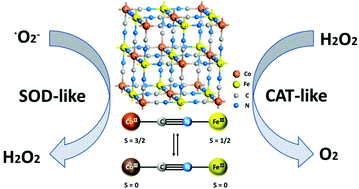Our official English website, www.x-mol.net, welcomes your feedback! (Note: you will need to create a separate account there.)
Prussian blue analogue nanoenzymes mitigate oxidative stress and boost bio-fermentation†
Nanoscale ( IF 5.8 ) Pub Date : 2019-09-13 , DOI: 10.1039/c9nr04951g Renwu Zhou 1, 2, 3, 4, 5 , Peiyu Wang 1, 2, 3, 4, 5 , Yanru Guo 6, 7, 8, 9, 10 , Xiaofeng Dai 10, 11, 12 , Shaoqing Xiao 10, 12, 13, 14, 15 , Zhi Fang 10, 16, 17, 18 , Robert Speight 1, 2, 3, 4, 5 , Erik W. Thompson 1, 2, 3, 4, 5 , Patrick J. Cullen 19, 20, 21 , Kostya (Ken) Ostrikov 1, 2, 3, 4, 5
Nanoscale ( IF 5.8 ) Pub Date : 2019-09-13 , DOI: 10.1039/c9nr04951g Renwu Zhou 1, 2, 3, 4, 5 , Peiyu Wang 1, 2, 3, 4, 5 , Yanru Guo 6, 7, 8, 9, 10 , Xiaofeng Dai 10, 11, 12 , Shaoqing Xiao 10, 12, 13, 14, 15 , Zhi Fang 10, 16, 17, 18 , Robert Speight 1, 2, 3, 4, 5 , Erik W. Thompson 1, 2, 3, 4, 5 , Patrick J. Cullen 19, 20, 21 , Kostya (Ken) Ostrikov 1, 2, 3, 4, 5
Affiliation

|
Oxidative stress in cells caused by the accumulation of reactive oxygen species (ROS) is a common cause of cell function degeneration, cell death and various diseases. Efficient, robust and inexpensive nanoparticles (nanoenzymes) capable of scavenging/detoxifying ROS even in harsh environments are attracting strong interest. Prussian blue analogues (PBAs), a prominent group of metalorganic nanoparticles (NPs) with the same cyanometalate structure as the traditional and commonly used Prussian blue (PB), have long been envisaged to mimic enzyme activities for ROS scavenging. However, their biological toxicity, especially potential effects on living beings during practical application, has not yet been fully investigated. Here we reveal the enzyme-like activity of FeCo-PBA NPs, and for the first time investigate the effects of FeCo-PBA on cell viability and growth. We elucidate the effect of the nanoenzyme on the ethanol-production efficacy of a typical model organism, the engineered industrial strain Saccharomyces cerevisiae. We further demonstrate that FeCo-PBA NPs have almost no cytotoxicity on the cells over a broad dosage range (0–100 μg mL−1), while clearly boosting the yeast fermentation efficiency by mitigating oxidative stress. Atmospheric pressure cold plasma (APCP) pretreatment is used as a multifunctional environmental stress produced by the plasma reactive species. While the plasma enhances the cellular uptake of NPs, FeCo-PBA NPs protect the cells from the oxidative stress induced by both the plasma and the fermentation processes. This synergistic effect leads to higher secondary metabolite yields and energy production. Collectively, this study confirms the positive effects of PBA nanoparticles in living cells through ROS scavenging, thus potentially opening new ways to control the cellular machinery in future nano-biotechnology and nano-biomedical applications.
中文翻译:

普鲁士蓝类似物纳米酶可减轻氧化应激并促进生物发酵†
活性氧(ROS)积累引起的细胞氧化应激是细胞功能退化,细胞死亡和各种疾病的常见原因。即使在恶劣的环境下也能清除/解毒ROS的高效,坚固和廉价的纳米颗粒(纳米酶)引起了人们的极大兴趣。长期以来,普鲁士蓝类似物(PBA)是一组重要的金属有机纳米粒子(NPs),具有与传统和常用普鲁士蓝(PB)相同的氰基金属酸盐结构,可模仿清除ROS的酶活性。然而,它们的生物毒性,特别是在实际应用过程中对生物的潜在影响,尚未得到充分研究。在这里,我们揭示了FeCo-PBA NP的酶样活性,并首次研究了FeCo-PBA对细胞活力和生长的影响。我们阐明了纳米酶对典型模型生物,工程化工业菌株的乙醇生产功效的影响。酿酒酵母。我们进一步证明,FeCo-PBA NP在较宽的剂量范围内(0–100μgmL -1,对细胞几乎没有细胞毒性)),同时通过减轻氧化应激来明显提高酵母发酵效率。大气压冷等离子体(APCP)预处理被用作等离子体反应性物质产生的多功能环境应力。虽然血浆增强了NPs的细胞摄取,但FeCo-PBA NPs保护细胞免受血浆和发酵过程诱导的氧化应激。这种协同作用导致更高的次级代谢产物产量和能量产生。总的来说,这项研究证实了PBA纳米颗粒通过清除ROS在活细胞中的积极作用,从而潜在地为控制未来纳米生物技术和纳米生物医学应用中的细胞机械开辟了新途径。
更新日期:2019-10-25
中文翻译:

普鲁士蓝类似物纳米酶可减轻氧化应激并促进生物发酵†
活性氧(ROS)积累引起的细胞氧化应激是细胞功能退化,细胞死亡和各种疾病的常见原因。即使在恶劣的环境下也能清除/解毒ROS的高效,坚固和廉价的纳米颗粒(纳米酶)引起了人们的极大兴趣。长期以来,普鲁士蓝类似物(PBA)是一组重要的金属有机纳米粒子(NPs),具有与传统和常用普鲁士蓝(PB)相同的氰基金属酸盐结构,可模仿清除ROS的酶活性。然而,它们的生物毒性,特别是在实际应用过程中对生物的潜在影响,尚未得到充分研究。在这里,我们揭示了FeCo-PBA NP的酶样活性,并首次研究了FeCo-PBA对细胞活力和生长的影响。我们阐明了纳米酶对典型模型生物,工程化工业菌株的乙醇生产功效的影响。酿酒酵母。我们进一步证明,FeCo-PBA NP在较宽的剂量范围内(0–100μgmL -1,对细胞几乎没有细胞毒性)),同时通过减轻氧化应激来明显提高酵母发酵效率。大气压冷等离子体(APCP)预处理被用作等离子体反应性物质产生的多功能环境应力。虽然血浆增强了NPs的细胞摄取,但FeCo-PBA NPs保护细胞免受血浆和发酵过程诱导的氧化应激。这种协同作用导致更高的次级代谢产物产量和能量产生。总的来说,这项研究证实了PBA纳米颗粒通过清除ROS在活细胞中的积极作用,从而潜在地为控制未来纳米生物技术和纳米生物医学应用中的细胞机械开辟了新途径。









































 京公网安备 11010802027423号
京公网安备 11010802027423号